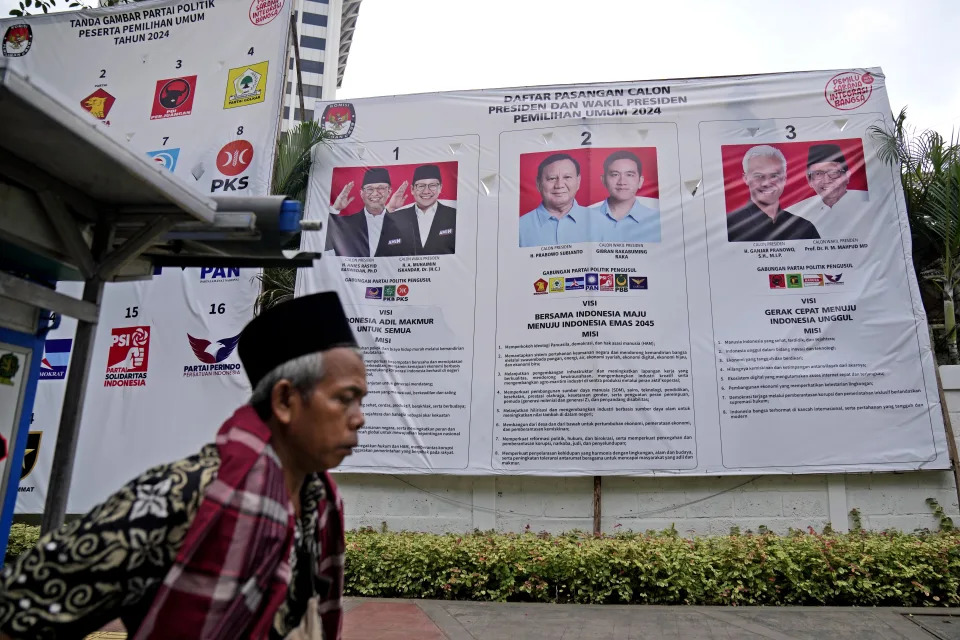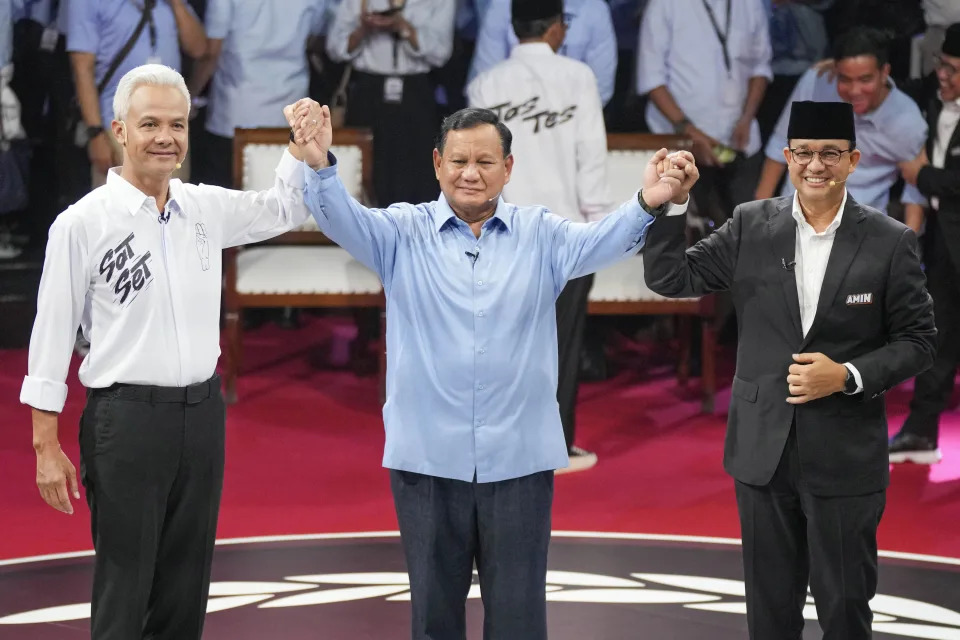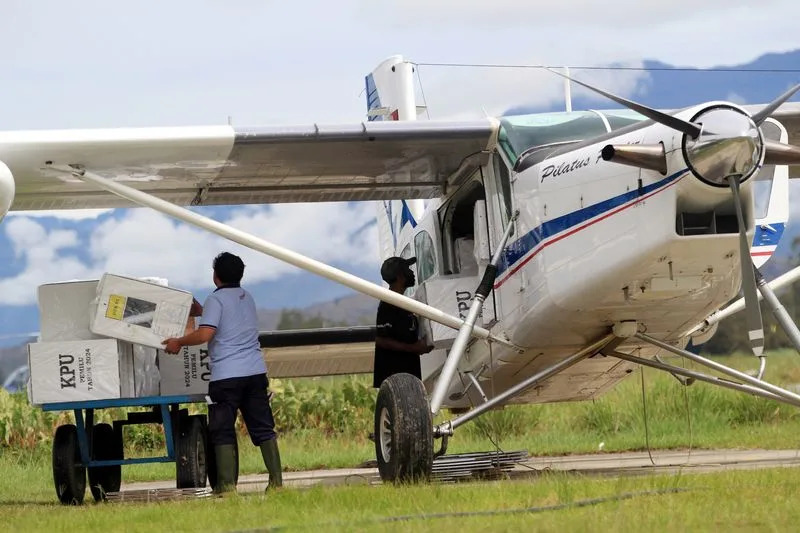When Indonesians cast their votes on Wednesday for a new president in one of the world’s biggest elections, the stakes will also be high for the United States and China.
The Southeast Asian nation is a key battleground economically and politically in a region where the rival global powers have long been on a collision course over Taiwan, human rights, U.S. military deployments and Beijing’s aggressive actions in disputed waters, including the South China Sea.
Outgoing President Joko Widodo’s foreign policy avoids criticism of Beijing and Washington but also rejects alignment with either power. The delicate balancing act has won considerable Chinese trade and investment for Indonesia, including a $7.3 billion high-speed railway that was largely funded by China, while Jakarta has also boosted defense ties and intensified military exercises with the U.S.
These policies would likely continue if election frontrunner Prabowo Subianto, the current defense minister whose vice presidential running mate is Widodo's eldest son, wins, according to analysts.
"None of the major structural features of defense and foreign policy, I think, will change,” said Evan Laksmana, a Southeast Asia security expert at the International Institute for Strategic Studies in Singapore.
Subianto adheres to a policy of neutrality and has publicly praised the U.S. and China. He cited America’s historical role in pressuring the Netherlands to recognize Indonesian sovereignty in the 1940s, during a forum in November at the Center for Strategic and International Studies think tank in Jakarta.
“This is part of history and we cannot forget this debt of honor,” said Subianto, who also extolled China’s importance to Southeast Asia. “China is a great civilization. It has contributed a lot and now it is very, very active and contributing a lot to our economy.”
Former Education Minister and Jakarta Governor Anies Baswedan, a presidential candidate who is trailing Subianto in most independent surveys, said he would shift what he called Widodo’s “transactional” foreign policy to one anchored on principles if he triumphs in the elections.
"When a country invades another country, we can say this is against our basic values. Even though we are friends, if rights were violated, we can reprimand them,” Baswedan told The Associated Press in an interview last month without saying which country he was alluding to.
Baswedan said human rights and environmental protection should underpin Indonesia’s foreign policy. “If we have no values, then there is a cost-benefit relationship, where we will only support countries that are profitable for us,” he said.
The U.S. and China have both seen how the emergence of a new leader in the region can threaten their interests.
Rodrigo Duterte, after capturing the Philippine presidency on an anti-crime platform in 2016, became one of the most vocal critics in Asia of U.S. security policy while nurturing close ties with Chinese leader Xi Jinping and Russian President Vladimir Putin.
Duterte threatened to evict American military personnel who were in the Philippines for combat exercises. He later moved to terminate a defense agreement with Washington that allowed thousands of Americans to enter the country for largescale combat drills, but he ended that effort as he appealed to the U.S. to provide vaccines at the height of the coronavirus pandemic.
Duterte's stormy term ended in 2016 and he was succeeded by Ferdinand Marcos Jr., who approved an expansion of the U.S. military presence at Philippine military bases under a 2014 defense pact. Marcos said his decision was aimed at bolstering his country’s territorial defenses at a time of increasing aggression by China's coast guard, navy and suspected militia forces in Philippine-claimed off-shore areas.
China protested the decision, saying it would provide American forces staging grounds in the northern Philippines across the sea border from the Taiwan Strait that could undermine Chinese national security.
Indonesia and other state members of the Association of Southeast Asian Nations belong to the Non-Aligned Movement, a Cold-War era bloc of mostly developing nations that aspire not to be formally associated with or against any major global power.
Still, the rivalry between Washington and Beijing has permeated the region.
Criticisms of China’s increasingly assertive actions in the disputed South China Sea have always been watered down in ASEAN, the 10-member regional bloc.
State members aligned with Beijing, in particular Cambodia and Laos, have opposed any such reproach or attempt to name China as the object of criticism in joint communiques after their annual summits, several regional diplomats have told The Associated Press on condition of anonymity over the years because they lacked authority to speak publicly.
Last year, the Philippine government accused the Chinese coast guard and suspected militia forces of using water cannons, a military-grade laser and dangerous maneuvers against Philippine coast guard patrol ships that caused minor collisions in a series of high-seas faceoffs in the disputed waters.
Under the chairmanship of Indonesia, ASEAN did not specifically mention China but only made general expressions of concern over aggressive behavior in the disputed waterway after their summit meetings.
What’s at stake in Indonesia as the world’s third-largest democracy elects a new president?
Presidential candidates, from left, Ganjar Pranowo, Prabowo Subianto and Anies Baswedan holds hands as they pose for photographers after the first presidential candidates' debate in Jakarta, Indonesia, Tuesday, Dec. 12, 2023. Indonesia, the world's third-largest democracy, will open its polls on Wednesday to nearly 205 million eligible voters in presidential and legislative elections, the fifth since Southeast Asia's largest economy began democratic reforms in 1998.
Indonesia, the world’s third-largest democracy, will open its polls on Wednesday to nearly 205 million eligible voters in presidential and legislative elections, the fifth since Southeast Asia’s largest economy began democratic reforms in 1998.
The sprawling archipelago of 17,000 islands and more than 270 million people from about 1,300 ethnic groups is a bastion of democracy in Southeast Asia, a diverse and economically vibrant region of authoritarian regimes, police states and nascent democracies.
WHAT IS AT STAKE IN THE ELECTION?
The presidential election will determine who will succeed President Joko Widodo, popularly known as Jokowi, who is serving his second and final term.
The election is shaping up to be a three-way race among current Defense Minister Prabowo Subianto and two former governors, Anies Baswedan and Ganjar Pranowo. If none of the candidates secures more than 50% of the votes in the first round, a runoff between the top two is scheduled for June 26.
Tens of thousands of candidates across the world’s largest archipelago nation are battling for some 20,000 national, provincial and district parliamentary positions. About 10,000 candidates from 18 political parties are contesting for spots in the 580-seat national parliament alone.
Political parties are required to have a woman in at least every third position in their party list, and parties need at least 4% of votes across the country to qualify for representation in the national parliament.
A party or coalition of parties needs to control at least 20% of seats in national parliament to nominate a presidential candidate.
HOW DOES INDONESIA'S ELECTION WORK?
Any Indonesian citizen who is 17 or older can vote, but members of the police and military are banned from voting, though their families can.
In this year's election, about 52% of registered voters are under the age of 40. A third of them are under the age of 30, making the “youth vote” important, and candidates have been making a concerted effort to target them through social media campaigns.
Voters can cast their ballots at over 820,000 polling stations across Indonesia’s three time zones. Polls will open at 7:00 a.m. and close at 1:00 p.m. and will be overseen by about 7 million election officials and independent workers. Indonesians living overseas have been casting votes since Feb. 5 at 3,000 polling stations in many countries or by mail.
Once entering a voting booth, a voter must deal with five ballots at once and choose one of the three pairs of presidential and vice presidential hopefuls, as well as representatives at the national, provincial, regional, regency and city levels, making it the most complex election in the world.
Votes are counted in public at polling stations.
WHY DO THESE ELECTIONS MATTER?
Located between the Indian and Pacific oceans, Indonesia is the world’s largest island chain and spans an equivalent distance from New York to London. It is the world's fourth most populous country, with a rich cultural heritage and diverse natural resources. Nearly 90% of Indonesia's 277 million people are Muslims, making it the world's largest Muslim-majority nation.
Indonesia’s strategic location also gives it geopolitical significance, and as a member of several international organizations, including the United Nations, G20 and ASEAN, it plays a key role in regional and global affairs. Indonesia’s political stability plays a central role in maintaining regional peace and stability.
WHAT IS WIDODO'S ROLE IN THE ELECTION?
There is unease in civil society that Widodo wants to retain influence even after leaving office. Activists, students and university lecturers in recent days have expressed concern over democratic standards in Indonesia, citing unethical, corrupt and nepotistic practices and worsening quality of life in the country.
Widodo faces mounting criticism over his lack of neutrality after he threw his support behind frontrunner Subianto, who has picked Widodo’s son as his running mate. Widodo has distanced himself from the governing Indonesian Democratic Party of Struggle, under whose banner he ran in 2014 and 2019, since the party nominated Ganjar Pranowo and former top security minister in his cabinet, Mohammad Mahfud, as presidential and vice presidential candidates.
WHO IS LIKELY TO WIN THE PRESIDENCY?
With three presidential candidates running, the electoral rules require a candidate to win at least 50% of the national vote and at least 20% of the vote in each province to avoid a runoff.
Various polling institutions have forecast that Subianto and his vice presidential candidate, Gibran Rakabuming Raka, will likely win the first round. But whether they will get enough votes to win the election outright or be forced into a runoff is still unclear as observers say undecided voters will have a significant impact on results. About one-fifth of Indonesians fell in this category in late December surveys.
The new president will be inaugurated on Oct. 20 and will have to appoint a Cabinet within two weeks.
WHEN ARE RESULTS EXPECTED?
The official vote-counting process, which is lengthy and laborious, may take up to 35 days to be completed, the maximum time regulated by the Elections Law.
But the public can expect numerous early vote count results based on sampling, as registered private polling and survey groups will deploy thousands of volunteers and staff to polling stations nationwide.
The early results, widely known as a “quick count,” are considered a reliable indicator of what the official count will show when all votes are tallied in about a month.
Indonesia in final stretch ahead of world's biggest single-day election
Election officers carry ballot boxes into a plane during distribution at Wamena airport in Papua province.
Indonesian authorities were making final preparations ahead of Wednesday's election, with around 25,000 police set to ensure security in a contest seen as a test of democratic gains made since the end of authoritarian rule 25 years ago.
Outgoing President Joko Widodo has presided over steady growth and relative stability in the past decade in the mineral-rich Group of 20 economy of 270 million people, establishing it as a future base for multinationals in the electric vehicle supply chain.
Still, Widodo, who is widely known as Jokowi, has in the run-up to the Feb. 14 presidential election faced criticism over his perceived political meddling and push to establish a political dynasty.
He has not explicitly endorsed any of the three presidential candidates but has made highly publicised appearances with controversial former special forces commander Prabowo Subianto, and his eldest son is running on the same ticket for vice president.
Two opinion surveys last week projected Defence Minister Prabowo, who is making his third run to be president, could secure more than 50% of the votes on Wednesday, allowing him to win in a single round. Rivals Anies Baswedan and Ganjar Pranowo were seen at least 27 and 31 points behind him respectively.
Indonesia has entered a cooling-off period until voting day, with candidates barred from campaigning.
Running an election is a gargantuan task in Indonesia. The archipelago of more than 17,000 islands stretches across three times zones and a distance similar to across the United States.
Election officials have delivered ballot boxes and papers to far-flung regions, in some cases travelling hours by boat, helicopter or ox-drawn carts.
The weather agency has warned about the risk of extreme weather in West Java on polling day, media reported. Meanwhile, the election commission has postponed voting in ten villages in the Karanganyar district in Central Java due to flooding.
Jokowi's tacit backing of Prabowo has led to accusations he has flouted election rules, which he rejects.
In Indonesia, sitting presidents can campaign for candidates providing they do not use state resources and must take official leave to do so. Incumbents have typically been neutral.
The presidential office has denied political meddling by Jokowi.
Hundreds of students held noisy street protests on Monday to protest against what they see as democratic backsliding under Jokowi, a former furniture salesman who seemed to offer a clean break from the military and political elite.
In 1998, huge student protests fuelled unrest that led to the fall of former strongman leader Suharto and helped usher in democracy.





